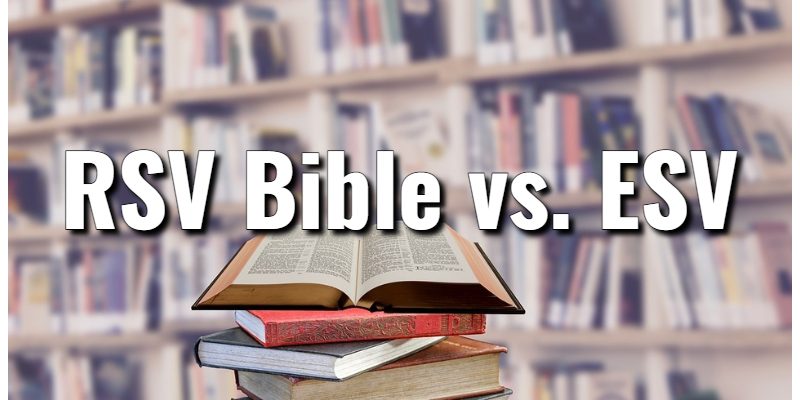This is part of Lord’s Library’s Bible Comparison Series. Our editors explore the RSV Bible vs. ESV so you can understand the major differences between each translation.
 When looking for a new Bible for yourself or as a gift, comparing the different Bible versions is an ideal first step. It’s also important that one considers the various Christian Church denominations when Bible shopping so the reader can be comfortable with their translation’s version of English. Some churches mandate a precise edition as well, while others may be curious about which version of the manuscript their favorite Bible translation comes from.
When looking for a new Bible for yourself or as a gift, comparing the different Bible versions is an ideal first step. It’s also important that one considers the various Christian Church denominations when Bible shopping so the reader can be comfortable with their translation’s version of English. Some churches mandate a precise edition as well, while others may be curious about which version of the manuscript their favorite Bible translation comes from.
.If you’ve ever asked the question “What’s the difference between the RSV Bible vs. ESV?” you’ve come to the right place. It’s in that spirit that our editors compiled this short resource by first offering a simple description of each Bible version, and then a comparison that highlights key contrasts. For each of the two Bible versions compared, Lord’s Library editors included links to our directories of the best editions, as well as the most popular products.
RSV Bible vs. ESV (English Standard Version)
What is the RSV Bible (Revised Standard Version)?
First published in 1952 by the Division of Christian Education of the National Council of the Churches of Christ in the USA, the Revised Standard Version Bible was created to be a readable yet literal modern English translation. Interesting to note is that the Revised Standard Version was the first Bible to make use of the Dead Sea Scroll of Isaiah. A 1989 revision of the Revised Standard Version was created, called the New Revised Standard Version, or NRSV. Modern criticism of this Bible states that liberal ideologies and theology are prominent in the text.
What is the ESV Bible (English Standard Version)?
Of the more modern, meaning-for-meaning translated Bibles, the English Standard Version most closely walks the line between literal, word-for-word translating and attempting to convey the meaning above all else. The first complete ESV Bible was published in 2001 by Crossway, as a revision of the Revised Standard Version. The team of over 100 evangelical scholars and pastors had a unique philosophy in translating this Bible: “Emphasizes word-for-word accuracy, literary excellence, and depth of meaning.”
The ESV remains a popular choice among evangelical churches. That’s because of its unique ability to walk that line between honoring the literal translations that preceded it (such as the RSV) while conveying meaning and modern language in an accessible way. This view is not shared by all though, as some believe that while pursuing this goal the translators have made a few grave errors in theology.
RSV Bible vs. ESV; What’s the Difference?
When you look at the past of the Revised Standard Version and the English Standard Version, you will see that they share a similar history. The ESV actually came into being as a revision of the RSV in the early 1990s. Crossway purchased the rights to the 1971 text edition of the Revised Standard Version as a basis for a new translation. Crossway then put together a team to make a new translation that was officially published as the English Standard Version in 2001.
The ESV was a more conservatively-minded translation than the RSV. In fact, there was much criticism of the RSV for being too theologically liberal. In light of that, one of the main goals of the English Standard Version was to remove all traces of that criticized theological basis. The Revised Standard Version used Biblica Stuttgartensia with influence from the Dead Sea Scrolls and the Septuagint for its Old Testament. For its New Testament, it used Novum Testamentum Graece. The ESV used Biblica Hebraica Stuttgartensia as its basis for the Old Testament and the UBS Greek for its New Testament.
ESV translation committee member Wayne Grudem claims that approximately eight percent (or about 60,000 words) of the 1971 RSV text being used for the ESV was revised as of its first publication in 2001. There is text left unchanged between the RSV and ESV, but only that which fits into the standards of the ESV translation.
Lord's Library participates in affiliate programs. We may make a small commission from products purchased through this resource.
- What Does the Bible Say About Discernment? With Key Scriptures - July 19, 2024
- What Does the Bible Say About Disobedience? With Key Scriptures - July 19, 2024
- 1 Timothy 1:12 Meaning: Commentary on an Important Scripture - July 11, 2024














